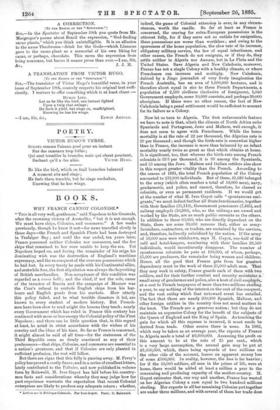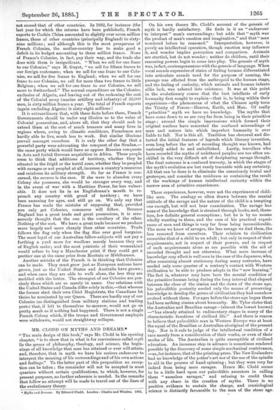BOOKS.
WHY FRANCE CANNOT COLONISE.*
" Tins is all very well, gentlemen," said Napoleon to his Generals, after the crowning victory of Austerlitz, " but it is not enough. We must have ships, Colonies, and commerce." A few weeks previously, though he knew it not—for news travelled slowly in those days—the French and Spanish Fleets had been destroyed in Trafalgar Bay ; and until the war ended, ten years later, France possessed neither Colonies nor commerce, and the few ships that remained to her were unable to keep the sea. Yet Napoleon hoped on, and during the remainder of his reign his dominating wish was the destruction of England's maritime supremacy, and the re-conquest of the over-sea possessions which he had lost. In every treaty he made with his Continental allies, and erstwhile foes, the first stipulation was always the boycotting of British merchandise. Non-acceptance of this condition was regarded as a cases belli ; and the chief, if not the sole, cause of the invasion of Russia and the campaign of Moscow was the Czar's refusal to exclude English ships from his har- bours and English goods from his markets. How utterly this policy failed, and to what terrible disasters it led, are known to every student of modern history. But French- men have been slow to read aright the lessons they teach; nearly every Government which has ruled in France this century has continued with more or less energy the Colonial policy of the First Napoleon ; and there can be little question that, in this regard at least, he acted in strict accordance with the wishes of his country and the ideas of his time. So far as France is concerned, it might almost be said of all time—for the statesmen of the Third Republic seem as firmly convinced as any of their predecessors—that ships, Colonies, and commerce are essential to a nation's greatness, and that if Colonies are only planted in sufficient' profusion, the rest will follow.
But there are signs that this folly is passing away. M. Ferry's policy has proved a costly fiasco; and in a series of excellent letters, lately contributed to the Voltaire, and now published in volume form by Reinwald, M. Ives Gayot has laid before his country- men facts and considerations whereby they may judge how far past experience warrants the expectation that recent Colonial enterprises are likely to produce any adequate return ; whether,
• .Lettres sus la Politiqus Colonials. Par Ives auyot. Paris : C. Reinwald.
indeed, the game of Colonial extension is ever, in any circum- stances, worth the candle. So far at least as France is concerned, the craving for extra-European possessions is the utterest folly, for if they serve not as outlets for emigration, these possessions are worse than worthless ; and owing to the sparseness of the home population, the slow rate of its increase,. obligatory military service, the law of equal inheritance, and other causes, the French do not emigrate, or if they do, they settle neither in Algeria nor Annam, but in La Plata and the United States. Save Algeria and New Caledonia, moreover, France has not a single Colony with a healthy climate, or where Frenchmen can increase and multiply. New Caledonia, dubbed by a Jingo journalist of very lively imagination the French Australia, has an area of 1,600,000 hectares, and is therefore about equal in size to three French Departments, a population of 2,500 civilians (inclusive of foreigners), 1,040 Government employ6s, some 10,000 convicts, and perhaps 30,000, aborigines. If there were no other reason, the fact of New' Caledonia being a penal settlement would be sufficient to account for its failure as a Colony.
Now let us turn to Algeria. The first unfavourable feature we have to note is that, albeit the climate of North Africa suits Spaniards and Portuguese, Jews and Maltese, well enough, it does not seem to agree with Frenchmen. While the home mortality is at the rate of 22 per thousand, the Algerian rate is 29 per thousand ; and though the birth-rate is somewhat higher than in France, the increase is more than balanced by an infant mortality nearly twice as great as that which obtains at home. It is significant, too, that whereas the birth-rate among French colonists is 33-3 per thousand, it is 39 among the Spaniards, and 53 among the Jews. Maltese and Italian settlers also show in this respect greater vitality than the French. According to the census of 1881, the total French population of the Colony amounted to 233,900 individuals. But of these, 41,626 belonged to the army (which often reaches a total of 50,000 men), navy, gendarmerie, and police, and cannot, therefore, be classed as colonists, or even as permanent residents. If we would get at the number of what M. Ives Guyot calls "spontaneous emi- grants," we must deduct further all State functionaries, together with their families (35,113), Government pensioners (7,465), and railway employes (16,260), who, as the railways are owned and worked by the State, are as much public servants as the others. In addition to these 60,000, who are directly dependent on the State, there are some 30,000 persons that, either as army- furnishers, contractors, or traders, are sustained by the services, and, therefore, indirectly subsidised by the nation. If the army of 50,000 men were withdrawn, says M. Gayot, one-half of the café and hotel-keepers, numbering with their families 29,509 individuals, would incontinently disappear. The number of spontaneous colonists he puts at 100,000, of whom, perhaps, 25,000 are producers, the remainder being women and children. Hence, all the good that France gets from her greatest dependency must be the work.of these 25,000 adult men. That they may work in safety, France guards each of them with two soldiers, and for their further comfort and security maintains a small army of gendarmes and police, also a host of civil employes, at a cost to French taxpayers of more than two millions sterling a year, to say nothing of the interest on the cost of the conquest, and the vast outlay which that untoward event has entailed. The fact that there are nearly 200,000 Spanish, Maltese, and other foreign settlers in the country does not mend matters in the least. The French are a generous nation ; but they do not maintain an expensive Colony for the benefit of the subjects of the Queen of England and the King of Spain. As touching the gain for which all this expense is incurred, it must needs be derived from trade. Other source there is none. In 1882, which may be taken as an average year, the exports of France to Algeria made a total of £6,600,000. Assuming the profit on this amount to be at the rate of 25 per cent., which is a very large assumption, the annual gain may be put at £1,650,000, which, there being upwards of two millions on the other eide of the account, leaves an apparent money loss of some £500,000. In reality, however, the loss is far heavier ; for if the 50,000 soldiers, all men in the prime of life, were at home, there would be added at least a million a year to the consuming and producing capacity of the mother-country.. M. Guyot estimates that, one way and another, France- has wasted on her Algerian Colony a sum equal to two hundred millions sterling. Her exports to all her remaining Colonies put together are under three millions, and with several of them her trade does
not exceed that of other countries. In 1882, for instance (the last year for which the returns have been published), French exports to Cochin China amounted to slightly over seven million francs, those of other countries (principally England) to sixty- nine millions ; and although this is the most prosperous of French Colonies, the mother-country has to make good a deficit in its budget amounting to three million francs. None of France's Colonies, in fact, pay their way, and the trade she does with them is insignificant. " When we sell for one franc to our Colonies," says M. Gnyot, " we sell for fifteen francs to our foreign customers ; when we sell for one franc to our Colo- nies, we sell for five francs to England ; when we sell for one franc to our Colonies, we sell for more than two francs to little Belgium ; when we sell for one franc to our Colonies, we sell more to Switzerland." The normal expenditure on the Colonies, exclusive of Algeria, and leaving out of the reckoning the cost of the Colonial army (marine artillery and infantry) of 26,000 men, is sixty million francs a year. The total of French exports (again excluding Algeria) is sixty-eight millions !
It is extraordinary that, with these facts before them, French Governments should be under any illusion as to the value of Colonial possessions, and, above all, that they should seek to extend them at the cost of much treasure and many lives in regions where, owing to climatic conditions, Frenchmen are hardly able to live, much less to work. But similar illusions prevail amongst ourselves. It is only the other day that a powerful party were advocating the conquest of the Soudan,— the same party which would have us oppose Russian conquests in Asia and forbid German acquisition in Africa. These people seem to think that additions of territory, whether they be situated in the frigid or the torrid zone, whether they be peopled with savages or not peopled at all, increase a country's resources and reinforce its military strength. So far as France is con- cerned, the reverse is the case. If she were to abandon every Colony she possesses, she would be stronger every way, and in the event of war with a Maritime Power, far less vulner- able. It does not lie in an Englishman's mouth to re- proach any country with greed of territory ; we have been annexing for ages, and still go on. We only say that France has made the mistake of supposing that, provided you only get Colonies, commerce will follow. Because England has a great trade and great possessions, it is erro- neously thought that the one is the corollary of the other. Nothing of the sort. We have a great trade because we produce more largely and more cheaply than other countries. Trade follows the flag only when the flag flies over good bargains. The most loyal of our Australian fellow-subjects will not pay a farthing a yard more for woollens merely because they are of English make ; and the most patriotic of their womankind would refuse to buy a Manchester print if they could get a prettier one at the same price from Roubaix or Miihlhausen.
Another mistake of the French is in thinking that Colonies can be made. They must grow just as European nations have grown, just as the United States and Australia have grown ; and when once they are able to walk alone, the less they are meddled with the better. The strongest of our Colonies are pre- cisely those which are so merely in name. Our relations with the United States and Canada differ solely in this,—that whereas the former elect their own Chief Magistrate, the Canadians let theirs be nominated by our Queen. There are hardly any of our Colonies (as distinguished from military stations and trading ports) that, if left to themselves to-morrow, would not go on pretty much as if nothing had happened. There is not a single French Colony which, if the troops and Government employes were withdrawn, would not straightway collapse.



































 Previous page
Previous page